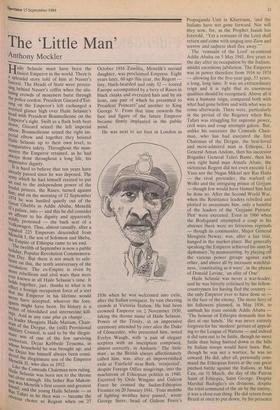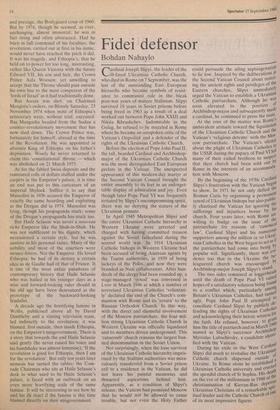The 'Little Man'
Anthony Mockler
Haile Selassie must have been the tiniest Emperor in the world. There is a splendid story told of him at Nasser's funeral. The Heads of State were proces- sing behind Nasser's coffin when the ulu- lating crowds of mourners burst through the police cordon. President Giscard d'Est- aing on the Emperor's left exchanged a Worried glance high over Haile Selassie's head with President Boumedienne on the Emperor's right. Swift as a flash both bent down; Giscard seized the left imperial elbow, Boumedienne seized the right im- perial elbow and together they hoisted Haile Selassie up to their own level, to Comparative safety. Throughout the man- oeuvre the Emperor retained, as he had always done throughout a long life, his impressive dignity. It is hard to believe that ten years have already passed since he was deposed. Tile army which he had himself created to put an end to the independent power of the fLe.ildal princes, the Rases, turned against . 411; and on the morning of 12 September 1974 he was hustled quietly out of the Great Ghebbi in Addis Ababa, Menelik II 's Palace, into — and this he did consider an affront to his dignity and apparently mildly protested — the back seat of a Volkswagen. Thus, almost casually, after a reputed 225 Emperors descended from the the son of Solomon and Sheba, h e Empire of Ethiopia came to an end. h T:he twelfth of September is now a public ti°11daY, Popular Revolution Commemora- b.," Day. But there is not much to cele- brate on this, the tenth anniversary of the revolution. The ex-Empire is riven by more rebellions and civil wars than were ever known in all Haile Selassie's time. It holds together, just, thanks to what is in titifect a foreign occupation force of a sort t the Emperor in his lifetime would never have accepted, whoever the fore- igners might have been. Its history is a iileuer of bloodshed and internecine kill- And in any case plus cc: change . . Itgs. Ills leader Mengistu Haile Mariam, Chair- ),.an. of the Dergue, the (still) Provisional Military Council, is said to be the illegiti- Ce son of one of the few surviving ;nose;nose household Dejaz Kebbede Tessema, in household he was brought up; and dee_ Dejaz has himself always been consi- dered the illegitimate son of the Emperor Menelik II, who dies in 1912. Like the Comrade Chairman now ruling, Haile Selassie was born not to the throne but close enough. His father Ras Makon- nn was Menelik's first cousin and greatest friend; and the young Haile Selassie — or Xs: Tafari as he then was — became the vl°us choice as Regent when on 27
October 1916 Zauditu, Menelik's second daughter, was proclaimed Empress. Eight years later, 60 ago this year, the Regent tiny, black-bearded and only 32 — toured Europe accompanied by a bevy of Rases in black cloaks and oversized hats and by six lions, one pair of which he presented to President Poincare and another to King George V. From that time onwards the face and figure of the future Emperor became firmly implanted in the public mind.
He was next to set foot in London in
1936 when he was welcomed into exile, after the Italian conquest, by vast cheering crowds at Victoria Station. He had been crowned Emperor on 2 November 1930, taking the throne name of Haile Selassie, Power of the Trinity, at an impressive ceremony attended by inter alios the Duke of Gloucester, who presented him, noted Evelyn Waugh, with 'a pair of elegant sceptres with an inscription composed, almost correctly, in Amharic.' The 'little man', as the British always affectionately called him, was, after an impoversished exile at 'Fairfield' near Bath, 'reinjected', despite Foreign Office misgivings, into the maelstrom of Ethiopian politics in 1940. Escorted by Orde Wingate and Gideon Force he crossed the Sudan-Ethiopian Frontier on 20 January 1941. 'Four months of fighting weather. have passed,' wrote George Steer, head of Gideon Force's
Propaganda Unit in Khartoum, 'and the Italians have not gone forward. Nor will they now, for, as the Prophet Isaiah has foretold, "Yet a remnant of the Lord shall return and come with singing into Zion and sorrow and sadness shall flee away."' The 'remnant of the Lord' re-entered Addis Ababa on 5 May 1941, five years to the day after its occupation by the Italians, amidst enormous jubilation. The Emperor was in power therefore from 1916 to 1974 — allowing for the five-year-gap, 53 years, a long, long time. It was an extraordinary reign and it is right that its enormous qualities should be recognised. Above all it was a humane reign, compared both with what had gone before and with what was to come afterwards. There were, particularly in the period of the Regency when Ras Tafari was struggling for supreme power, civil wars and coup attempts galore. But, unlike his successor the Comrade Chair- man, who has had executed the first Chairman of the Dergue, the best-loved and most-admired man in Ethiopia, Lt General Aman Andom, then his successor Brigadier General Taferi Bante, then his own right hand man Atnafu Abate, the victorious Regent did not even execute Lij Yasu nor the Negus Mikael nor Ras Hailu — the rival pretender, the warlord of Wollo and the intriguing prince of Gojjam — though few would have blamed him had he done so. After the Second World War, when the Resistance leaders rebelled and plotted to assassinate him, only a handful of the leaders of the `Gojjami Patriots' Plot' were executed. Even in 1960 when the Bodyguard attempted a coup in his absence there were no ferocious reprisals
— though its commander, Major General Mengistu Neway, was, after a fair trial, hanged in the market-place. But generally speaking the Emperor achieved his aims by. diplomacy,/ by manoeuvring, by playing off the various power groups against each other, and above all by incessant watchful- ness, 'constituting as it were', in the phrase of Donald Levine, `an elite of One'.
Haile Selassie was never a war-leader; and he was bitterly criticised by his fellow- countrymen for having fled the country the only Emperor ever to have done so in the face of the enemy. The more fiery of his followers planned, in May 1936, to ambush his train outside Addis Ababa 'The honour of Ethiopia demands that he dies at our hands.' He was never entirely forgiven for his 'modern' gesture of appeal- ing to the League of Nations — and indeed it did turn out to be futile, though no more futile than being hunted down in the hills by Italian troops would have been. But, though he was not a warrior, he was no coward. He did, after all, personally com- mand the Ethiopian forces at the one great pitched battle against the Italians, at Mai Ceu, on 31 March, the day of the Patron Saint of Ethiopia, Saint George. Despite Marshal Badoglio's six divisions, despite the total command of the air by the enemy, it was a close-run thing. He did return from Brazil at once to put down, by his presence
and prestige, the Bodyguard coup of 1960. But by 1974. though he seemed, as ever, unchanging, almost immortal, he was in fact tiring and often abstracted. Had he been in full command of his faculties, the revolution, carried out at first in his name, would never have reached the pitch it did. It was his tragedy, and Ethiopia's, that he held on to power for too long, mistrusting, rather like Queen Victoria with the future Edward VII, his son and heir, the Crown Prince Asfa Woosen; yet unwilling to accept that the Throne should pass outside his own line to the most competent of the lords of Israel' as it had traditionally done.
Ras Asrate was shot, on Chairman Mengistu's orders, on Bloody Saturday, 23 November 1974 when most of Ethiopia's aristocracy were, without trial, executed. Ras Mangasha headed from the Sudan a counter-revolutionary movement that has now died down. The Crown Prince was, fortunately for himself, abroad at the time of the Revolution. He was appointed in absentia King of Ethiopia on his father's deposition. Wisely he never returned to claim this 'constitutional' throne — which was abolished on 21 March 1975.
As for the fabled Swiss deposits and the rumoured rolls of dollars stuffed under the carpets in the Emperor's palace, it is time an end was put to this caricature of an imperial Shylock. Suffice it to say that Mussolini in 1936 accused the Emperor of exactly the same hoarding and exploiting as the Dergue did in 1974. Mussolini was lying, though his propaganda stuck; some of the Dergue's propaganda has stuck too.
But Haile Selassie was never a nouveau riche Emperor like the Shah-in-Shah. He was not indifferent to his dignity, which necessitated a certain style, but he was austere in his personal tastes. Many of the nobility and most of the courtiers were money-lovers. Not the Emperor. He loved Ethiopia; he had of its destiny a certain idea as de Gaulle had of that of France. It is one of the most unfair paradoxes of contemporary history that Haile Selassie who was hailed in his younger days as a wise and forward-looking ruler should in his old age have been denounced as the prototype of the backward-looking feudalist.
A decade ago the horrifying famine in Wollo, publicised above all by David Dimbleby and a visiting television team, led indirectly to the revolution; it was blamed, first outside, then inside Ethiopia, on the Emperor's misgovernment. There is a story that towards the end Haile Selassie said gently (he never raised his voice and his handshake was almost feminine), If the revolution is good for Ethiopia, then I am for the revolution'. But only ten years later nemesis has turned the tables; the Com- rade Chairman who sits at Haile Selassie's desk in what used to be Haile Selassie's palace, is faced with an outbreak on an even more horrifying scale of the same famine. It will be interesting to see how he and his ilk react if the famine is this time blamed directly on their misgovernment.



















































 Previous page
Previous page